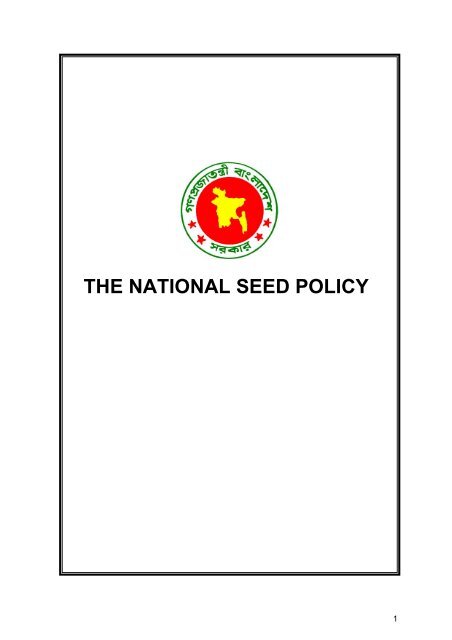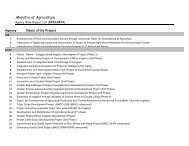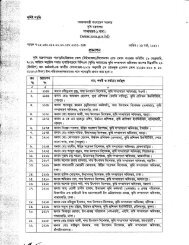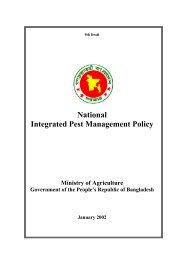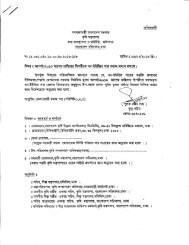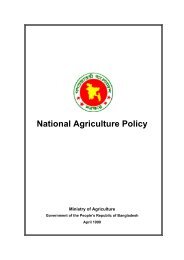The National Seed Policy - DAE
The National Seed Policy - DAE
The National Seed Policy - DAE
You also want an ePaper? Increase the reach of your titles
YUMPU automatically turns print PDFs into web optimized ePapers that Google loves.
THE NATIONAL SEED POLICY<br />
1
Ministry of Agriculture<br />
Section-12<br />
Quality seed is considered to be the basic input for increasing agricultural output and<br />
thereby achieving self-sufficiency in food production. Effectiveness of other inputs like<br />
fertilizer and irrigation depends largely on good seed. But use of improved seed is still very<br />
limited. Two major reasons behind this fact are:<br />
- Production and distribution of quality seed is insufficient in the public sector as<br />
compared to its demand;<br />
- <strong>Seed</strong> production in the private sector has not yet got the necessary support.<br />
Development of facilities in public and private sectors for production of sufficient<br />
quantity of improved seed and for making them available to the farmers at appropriate time<br />
and at reasonable price has been suffering from lack of definite policy directives. At the<br />
same time potentiality of technical assistance could not be explored due to absence of a<br />
clear Govt. policy in this field. With a view to overcoming this critical situation the MOA has<br />
formulated a <strong>National</strong> <strong>Seed</strong> <strong>Policy</strong> for the country.<br />
A committee, formed by the MOA, reviewed the seed policies of a number of<br />
neighbouring countries and drafted a <strong>National</strong> <strong>Seed</strong> <strong>Policy</strong> drawing lessons and inputs from<br />
the experiences of countries having similar agro-ecological and socio-economic settings.<br />
<strong>National</strong> <strong>Seed</strong> <strong>Policy</strong> provides for policy directives to increase production of improved<br />
seed both in the public and private sectors and for making best quality seeds available to the<br />
farmers on timely basis, and at competitive price. <strong>The</strong> seed policy has also provisions,<br />
among other things, for liberalisation of import of seed and seed processing machineries,<br />
strengthening of quality control and research system and maintaining a seed security<br />
arrangement. A major thrust of the seed policy has been on the institutional arrangement of<br />
the seed sector.<br />
2
<strong>National</strong> <strong>Seed</strong> Board has approved the draft of <strong>National</strong> <strong>Seed</strong> <strong>Policy</strong><br />
<strong>The</strong> <strong>Seed</strong> <strong>Policy</strong> of Bangladesh<br />
1. Objectives of the <strong>Seed</strong> <strong>Policy</strong>:<br />
1.1. Overall Objectives:<br />
<strong>The</strong> overall purpose of this policy is to make the best quality sees of improved<br />
varieties of crops conveniently and efficiently available to farmers with a view to<br />
increasing crop production, farmer's productivity, per capita farm income and<br />
export earnings.<br />
1.2 Specific Objectives:<br />
1. To breed, develop and maintain improved crop varieties with special<br />
emphasis on those suitable for high-input and high-output agriculture.<br />
2. To multiply and distribute, on a timely basis, to all farmers sufficient quantities<br />
of quality seed of improved high yielding varieties that are resistant or tolerant<br />
to disease and insect pests.<br />
3. To promote farmer's acceptance and use of improved varieties of seeds.<br />
4. To promote, through education, training and financial supports, balanced<br />
development of public and private sector seed enterprises.<br />
5. To simplify the importation, for research and commercial purposes, of high<br />
quality seeds and planting materials.<br />
6. To promote seed technology by providing training and technical supports to<br />
agricultural specialists and professionals, farmers and workers, and private<br />
seed growers and merchants in seed production, processing, storage and use<br />
of high quality seeds.<br />
7. To monitor control and regulate the quality and quantity of seeds produced as<br />
well as development and commercialisation of the seed industry.<br />
2. Strategy for <strong>Seed</strong> Development:<br />
To achieve the above objectives, the following strategies, among others, are to be<br />
followed:<br />
2.1 To strengthen the institutional capability of the public and private sector entities<br />
engaged in the seed industry.<br />
2.2 To evolve and/or adapt seed technology to meet the needs of high-input and<br />
high-output agriculture.<br />
2.3 To promote balanced development of the seed sector by providing equitable<br />
opportunities to the public and private sector at all stages of the seed industry<br />
from breeding to marketing of seeds.<br />
2.4 To simplify procedures for import of high quality seeds and planting materials,<br />
both by the public and private sectors to enable farmers to have access to the<br />
best quality materials available in the world.<br />
2.5 To strengthen seed certification, quality control and testing facilities to ensure<br />
availability of quality seeds to farmers.<br />
2.6 To simplify procedures for effective observance of plant quarantine.<br />
3
3. Development and Promotion of Improved <strong>Seed</strong> Varieties:<br />
3.1 Variety development programmes should, as a matter of priority, be focused on<br />
generation of high-input and high-output technologies.<br />
3.2 <strong>The</strong> NARS will continue to pursue plant breeding programs for all crops of<br />
national importance. However, special efforts will be made to evolve improved<br />
varieties for pulses, oil seeds, tuber crops, vegetables, fruits and spices.<br />
3.3 Improved varieties of seeds and planting materials should be procured and<br />
introduced in the country by allowing their import, especially through private seed<br />
entrepreneurs. For this purpose, business contracts, including joint ventures, are<br />
to be encouraged between private enterprises and foreign seed companies.<br />
3.4 Private persons, companies and other agencies will be encouraged to undertake<br />
plant breeding programs and will be allowed to import breeder/foundation seeds<br />
of notified crops for variety development and promotion purposes.<br />
4. Approval and Registration of Varieties:<br />
4.1 New varieties of wheat, rice, jute, potato and sugarcane developed by private or<br />
public agencies will be subject to notification by the <strong>National</strong> <strong>Seed</strong> Board.<br />
4.2. Varieties of all other crops developed by public research agencies will be subject<br />
to an internal review and approval by each respective agency and must be<br />
registered with NSB before being released.<br />
4.3 Varieties of crops, other than rice, wheat, jute potato and sugarcane that are<br />
imported or locally developed by a private person, company or agency must be<br />
registered with the NSB giving prescribed cultivar descriptions, but will not be<br />
subject to any other restrictions.<br />
4.4 In the event a variety of seed is found to be harmful or potentially harmful to the<br />
country's agriculture, the NSB will prohibit the sale of that variety.<br />
5. Variety Release:<br />
<strong>The</strong> variety release and variety notification function will be separated. <strong>The</strong> NSB shall<br />
notify varieties of seeds under the provisions of the <strong>Seed</strong>s Ordinance. <strong>The</strong> release of<br />
varieties of controlled crops such as rice, wheat, jute, potato and sugarcane, or those<br />
added by NSB, shall vest in a Technical Committee headed by Executive Vice-<br />
Chairman, BARC and consisting of representatives of major research institutions<br />
(BARI, BRRI, BJRI, SRTI), SCA, <strong>DAE</strong>, BADC, private sector <strong>Seed</strong> Growers and<br />
Farmers Associations.<br />
6. Maintenance Breeding:<br />
Maintenance breeding and breeder seed multiplication is to be improved and<br />
strengthened at the NARS. For this purpose, required facilities, equipment, trained<br />
personnel etc, shall be provided at the respective research centres and stations.<br />
7. <strong>Seed</strong> Multiplication:<br />
7.1 Breeder and Foundation seed, of all varieties will be made available through<br />
negotiation to duly registered seed producers both in the private and public<br />
sector.<br />
7.2 BADC will concentrate primarily on producing foundation seeds of rice, wheat,<br />
jute, potato and sugarcane on its own farms.<br />
4
7.3 BADC will use farmers to multiply seeds on a contract basis and will gradually<br />
cease to grow certified seed on its own seed farms.<br />
8. Import of <strong>Seed</strong>s:<br />
8.1. Except for appropriate plant quarantine safeguards, restrictions on importation of<br />
seeds are to be eliminated. Approved varieties of rice, wheat, jute, potato and<br />
sugarcane may be imported for commercial sale. However, registered seed<br />
growers will be permitted to import small quantities of seeds of rice, wheat, jute,<br />
potato and sugarcane for adaptability testing.<br />
8.2 <strong>The</strong> Plant Quarantine Regulations provided under the Destructive Insect and Pest<br />
Act 1966 (as amended upto 1989) are to be reviewed and reformed with a view to<br />
simplifying procedures to facilitate import of high quality seeds and planting<br />
materials. Plant quarantine procedures will be made applicable to crop/plant<br />
species and not to specific varieties.<br />
9. <strong>Seed</strong> Regulations:<br />
9.1 Controlled crops:<br />
<strong>The</strong> NSB shall designate kinds and varieties of crops that are to be notified.<br />
Initially, rice, wheat, jute, potato and sugarcane will be the only notified crops.<br />
Release of the varieties of notified crops will be subject to evaluation and testing<br />
by the Technical Committee on <strong>Seed</strong>s. Varieties of all other crops will have to be<br />
registered prior to being sold, but there will be no requirement for prior testing and<br />
approval.<br />
9.2 Registration of Varieties:<br />
Any variety, whether imported or developed in Bangladesh, must registered with<br />
the <strong>National</strong> <strong>Seed</strong> Board. <strong>The</strong> registration will require the characteristics and<br />
attributes of the variety to be described.<br />
Registration will be a relatively easy process designed to facilitate legitimate<br />
identification. Except for controlled or notified crops, registration will not involve<br />
testing or any other procedure.<br />
9.3 Registration of <strong>Seed</strong> Dealers:<br />
Any individual, company or agency that wishes to import seed, develop and<br />
register new seed varieties, or package seed in labelled containers must first be<br />
registered with the <strong>National</strong> <strong>Seed</strong> Board. Registration will be automatic by paying<br />
the prescribed fees.<br />
9.4 Labelling of <strong>Seed</strong>s:<br />
Anyone packaging seed in labelled containers must do so in accordance with<br />
requirements prescribed under the s,eeds rules. <strong>The</strong> labelling requirements will<br />
specify variety of crop, lot number or batch identification, net weight or count,<br />
minimum germination percentage, physical purity, name and address of the<br />
company packaging the seed and the date of packaging.<br />
9.5 <strong>Seed</strong> Certification:<br />
<strong>Seed</strong> certification will be a service provided to private individuals, companies or<br />
public agencies who wish to assure their farmercustomers that their seeds are of<br />
high quality. Although seed certification. will be voluntary, public sector<br />
breeder/foundation seeds will be certified as a matter of policy.<br />
5
9.6 <strong>Seed</strong> Quality Control:<br />
<strong>Seed</strong> quality will be ensured by requiring seeds in labelled containers/packages<br />
to meet the standards specified on the label. <strong>Seed</strong> dealers who develop a good<br />
reputation will be protected by making it illegal for anyone to sell seeds in a<br />
labelled container that copies the name or trademark of any registered seed<br />
dealer.<br />
10. <strong>Seed</strong> Security:<br />
BADC and NARS will be required to maintain small stocks of improved varieties of rice,<br />
wheat and jute seeds so that when natural disasters occur, and seed supplies in an<br />
area are lost; seed of superior quality will be available for distribution. <strong>The</strong> amount of<br />
seed to be stored will be subject to further assessment and budgetary considerations.<br />
11. Strengthening Institutional Capability of the <strong>Seed</strong> Sector:<br />
11.1. Strengthening NSB:<br />
11.1.1 <strong>The</strong> NSB will be strengthened through necessary amendments in the<br />
<strong>Seed</strong> Laws to establish it as the highest authority for policymaking and<br />
planning for development of the national seeds system.<br />
11.1.2 Reorganization of NSB:<br />
<strong>The</strong> NSB will be reconstituted as follows to ensure representation of all<br />
concerned with the development of the seed industry:<br />
1. Secretary, MOA Chairman<br />
2. Vice Chairman, BARC Member<br />
3. Heads of <strong>National</strong> Research Institutions Members<br />
(BARI, BRRI, BJRI, BAU, SRTI, BINA, Cotton Board) (7)<br />
4. Director General, <strong>DAE</strong> Member<br />
5. Chairman, BADC Member<br />
6. Member Director (<strong>Seed</strong>s), BADC Member<br />
7. Representative of <strong>Seed</strong> Growers Association Member<br />
8. Representative of <strong>Seed</strong> Merchants Association Member<br />
9. Director <strong>Seed</strong> Certification Agency Member<br />
10. Director Plant Protection, <strong>DAE</strong> Member<br />
11. Representative of Ministry of Finance Member<br />
12. Representative of Farmer's Association Member<br />
13. Director General (<strong>Seed</strong>), MOA Member-Secretary<br />
11.1.3. Creating a <strong>Seed</strong>s Wing in the Ministry of Agriculture:<br />
A <strong>Seed</strong> Wing will be created in the Ministry of Agriculture, primarily to<br />
serve as a Secretariat for the NSB, and to perform among others, the<br />
following functions:<br />
1. to help update policies and plan strategies for the development of<br />
the seed industry with special attention given to promoting private<br />
sector seed enterprises and to ensure implementation of such<br />
policies and strategies;<br />
2. to monitor development and commercialisation of the seed sector;<br />
3. to oversee and co-ordinate the production of breeder and foundation<br />
seed by public and private seed enterprises to meet farmerfs<br />
demands;<br />
4. to promote human resource development in the seed sector through<br />
training, seminars and workshops;<br />
5. to develop a permanent cadre of trained and experienced seed<br />
technologists in public sector institutes to ensure sustained growth<br />
of the seed industry;<br />
6
6. to plan and promote seed technology research in the NARS, BAD<br />
and the private sector;<br />
7. to plan and implement a seed security system including<br />
maintenance of buffer stocks of seeds;<br />
11.2. Strengthening of BADC-<strong>Seed</strong> Wing:<br />
11.2.1 Reorganization of the <strong>Seed</strong> Wing:<br />
(a) <strong>The</strong> <strong>Seed</strong> Wing is to run on a commercial basis as far as possible<br />
and be given control over the planning and financing of its operation.<br />
(b)<br />
<strong>The</strong> <strong>Seed</strong> Wing will be reorganized to include such as <strong>Seed</strong><br />
Production Division, <strong>Seed</strong> Conditioning, Processing and Storage<br />
Division, <strong>Seed</strong> Marketing Division with an internal quality control<br />
system, and an Administration Division.<br />
11.2.2 Roles and Functions:<br />
<strong>The</strong> role and function of the <strong>Seed</strong> Wing should include, among others, the<br />
following:<br />
(a)<br />
(b)<br />
(c)<br />
Foundation seed production of all publicly developed varieties of<br />
controlled crops.<br />
Production of other kinds of seeds on a "level playing field" in<br />
competition with the Private Sector. BADC should gradually<br />
withdraw from production of those kinds of seeds undertaken by<br />
the private sector.<br />
<strong>The</strong> <strong>Seed</strong> Wing should provide technical assistance and other<br />
support/services to promote the development of a private sector<br />
seed industry.<br />
11.2.3 <strong>Seed</strong> Pricing and Subsidies:<br />
BADC's seed prices should reflect costs more closely and subsidies<br />
should be phased out gradually.<br />
11.2.4 Resources and Facilities:<br />
BADC's seed multiplication farms will be turned to other uses except those<br />
most suitable for foundation seed production. All production beyond the<br />
foundation seed class, and including foundation seed if possible, will be<br />
done by contract growers. Excess facilities, especially those of smaller<br />
scale, will be made available on a lease basis to the private sector for<br />
growing seeds.<br />
11.2.5 Marketing:<br />
<strong>The</strong> seed sale centres at the Upazila level will be phased out and replaced<br />
with a network of seed dealers. <strong>The</strong> regional and transit seed centres will<br />
be designated and developed as "lifting" sites for prLvate sector dealers.<br />
11.2.6 Reserve <strong>Seed</strong>s Stocks:<br />
<strong>The</strong> <strong>Seed</strong> Wing will be given management and operational responsibility<br />
for seed security stocks with budget allocation for this purpose.<br />
11.2.7 Local/Improved/Popular Varieties:<br />
<strong>The</strong> BADC-<strong>Seed</strong> Wing will be authorized to purify and maintain local<br />
varieties for which there is substantial and steady demand. Purification<br />
and maintenance will be done on the seed farms.<br />
7
11.2.8 BADC's role will be reoriented to promote development of the private<br />
sector seed industry by:<br />
(a) advising and training private seed producers to produce, process,<br />
store and market quality seeds;<br />
(b) advise private seed entrepreneurs to manage and finance their seed<br />
companies;<br />
(c) custom process, test and store, if convenient, seed of private<br />
entrepreneurs at BADe's facilities;<br />
(d) negotiate with private sector seed enterprises for potential take-over<br />
of BADe's Contract Grower's Scheme;<br />
(e) providing seed-testing facilities to private seed entrepreneurs.<br />
11.3 Support for <strong>Seed</strong> Businesses:<br />
11.3.1 <strong>The</strong> business of seed breeding, multiplication, production processing,<br />
import and marketing should be declared as an agrobased industry under<br />
the Industrial Investment Schedule to make such companies eligible for<br />
various incentives, supports and concessions.<br />
11.3.2 Individuals, companies or agencies engaged in the seed business should<br />
be allowed easy access to institutional credit at preferential rates of<br />
interest.<br />
11.3.3 Foreign Exchange:<br />
Importers of seeds and seed processing equipment will be made eligible<br />
for allotment of foreign exchange. <strong>Seed</strong> merchants will be allowed to enter<br />
into supplier's credit arrangements with foreign seed suppliers.<br />
11.3.4 Access to Facilities and Equipment:<br />
private sector seeds men will be granted access to storage space, drying<br />
floors, dryers, cleaning equipment, and related equipment and facilities<br />
that are in excess of BADC-<strong>Seed</strong> Wing needs. Access will be through<br />
custom services, lease, or lease-purchase arrangements.<br />
11.3.5 Technical Assistance and Services:<br />
Technical assistance, training and services from BADC-<strong>Seed</strong>s Wing, <strong>DAE</strong>,<br />
Research Institutes, NSTL, SCA and other public sector units involved in<br />
the seeds industry will be made available to private sector seeds men on<br />
request for a reasonable fee in connection with services such as seed<br />
testing, certification and inspection. <strong>The</strong> private sector will be granted<br />
access to or included in all donor assisted and organized seed related<br />
training courses, workshops and study tours._ In cases where expert<br />
technical assistance is brought into Bangladesh under donor financed<br />
seed related projects, the technical assistance and services will also be<br />
made available to the private sector. <strong>The</strong> Bangladesh <strong>Seed</strong>s Merchants<br />
Association and the Bangladesh <strong>Seed</strong> Producers Association will be used<br />
as a mechanism for communicating with the private sector.<br />
11.3.6 Private Sector Representation in <strong>Seed</strong> <strong>Policy</strong> Making:<br />
<strong>The</strong> private sector will be allowed representation in the <strong>National</strong> <strong>Seed</strong><br />
Board, Variety Release Committee, and in any special committee<br />
constituted for or in the interest of seed production in Bangladesh.<br />
11.3.7 Concessions and Incentives:<br />
Favourable policies, incentives, and support will be provided to promote<br />
private sector participation in the seed industry.<br />
8
11.4. Strengthening of the <strong>Seed</strong> Certification Agency (SCA):<br />
To facilitate implementation of the new <strong>Seed</strong> <strong>Policy</strong>, the role of SCA will be<br />
expanded beyond seed certification to include seed quality control and testing<br />
and enforcement of seed regulations. For this purpose the SCA will be<br />
strengthened by provision of expanded infrastructure and laboratory facilities,<br />
increased number of trained seed technologists, and gradual development of a<br />
seed sub-cadre. <strong>The</strong> expanded role of SCA will be to:<br />
1. advise seed producers on production, processing and quality control of<br />
seeds;<br />
2. carry out post-market quality control through inspection, testing;<br />
3. collect data/information on seed production, processing and quality control<br />
for use by the NSB;<br />
4. certify all Breeder and Foundation seed of controlled crops;<br />
5. certify seeds for seed enterprises as a service, if resources permit;<br />
6. co-ordinate the variety evaluation and release mechanism for notified crops;<br />
7. advise NSB on the denotification of varieties for reasons of poor<br />
performance or disease and pest susceptibility;<br />
8. help <strong>DAE</strong> in the promotion and use of improved seed of HYV's among<br />
farmers;<br />
9. collect samples of truthfully labelled seeds throughout the country and check<br />
their declared standards through appropriate tests;<br />
11.5. <strong>National</strong> Agricultural Research System (NARS):<br />
Varietal development by NARS should anticipate the increase in irrigated highinput,<br />
high-output cropping systems and adapt their crop species and variety<br />
selection criteria accordingly. With an increasing demand of food per unit area PY<br />
a fast expanding population, it is imperative that NARS respond by releasing<br />
seeds of high-input responsive crop varieties into the agricultural sector. In<br />
particular, the use of hybrids must be expanded. To achieve this, the NARS will:<br />
1) reorientated its plant breeding programmes to develop varieties that<br />
respond to sustainable high-input, high-output technology especially<br />
emphasising diversified crops, such as oilseeds, pulses, cereals (other than<br />
rice), vegetables, fruits, etc. that fit into rice-based cropping systems. <strong>The</strong><br />
NARS will need to respond to farmer's current demands for varieties and<br />
crops;<br />
2) design breeding programmes keeping in mind the opportunity of importing<br />
improved seed which may be an economic way to obtain improved varieties;<br />
3) develop adequate maintenance breeding units at .their regional/central<br />
research stations;<br />
4) co-ordinate variety development programmes between scientists and<br />
institutes in both public and private sectors by developing common<br />
objectives and testing procedures.<br />
11.6. Department of Agricultural Extension:<br />
<strong>DAE</strong> will be responsible for promoting newly envolved superior crop varieties. For<br />
this purpose <strong>DAE</strong> will:<br />
1) Monitor the farmer's response/demand for varieties .and transmit farmer<br />
preferences to the NSB so that adjustments to production of Breeder and<br />
Foundation seed can be made;<br />
2) Promote new varieties among farmers through demonstration plots;<br />
3) Advise NSB on developments in the seed sector;<br />
9
4) Create a suitable career structure for seed technologists in all seed sector<br />
agencies so that staff continuity and retention of experience can be<br />
achieved;<br />
5) Improve facilities at entry points for laboratory testing and post-entry<br />
quarantine testing.<br />
11.7. Agricultural Information Services (AIS):<br />
AIS will facilitate dissemination and sharing of information from private and public<br />
sector seed agencies and enterprises with the farming public, particularly with<br />
respect to promotion of new varieties.<br />
11.8 Bangladesh Agricultural University (BAU):<br />
BAU will undertake the following:<br />
1) Establish/strengthen a course in seed technology, which would cover all<br />
aspects of the seed industry from seed breeding to its multiplication an<br />
distribution, seed policy and seed industry development;<br />
2) Develop its seed laboratory as a <strong>National</strong> <strong>Seed</strong> Health Laboratory which<br />
will, besides supporting the university's teaching functions, regulatory review<br />
the seed quarantine requirements and develop seed technology necessary<br />
for the production of healthy seed.<br />
3) Promote the technology and production of inoculum for legume seeds in<br />
both public and private sectors.<br />
By order of the President<br />
D. L. Chowdhury<br />
Senior Assistant Secretary<br />
10


